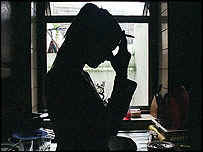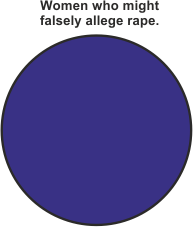|
The Rape Deception One of the most common deceptive ploys purposely engaged in by the feminists (and often unthinkingly endorsed by their gullible women supporters) is the attempt (which is usually successful) to hoodwink the public over the issue of false rape allegations by continually making references to women who have, in fact, been raped. But, of course, these women have no relevance to the issue of false allegations. A typical example of this devious tactic can be seen in this very short piece by the BBC news department to do with the increasing concern of UK judges over the biases against male defendants in rape trials. This judicial concern is about the men who are being falsely accused and wrongfully convicted as a result of these biases, but the BBC posts this picture of a supposedly traumatised woman alongside its piece.
The idea, clearly, is to divert the reader's attention away from the fact that the judges' concern is about men, and to endorse the view that men are 'getting away with rape' because women are not reporting the matter - as per the picture above. This is a blatant attempt by the BBC to cover up the concerns of the judges. Much more often, however, whenever the issue of false allegations is brought up, one is deluged by histrionics of the following type, ... I have known hundreds of women who have been raped but never reported the crime. I have seen hundreds of women who have been raped and beaten, mostly by men whom they knew. The official figures show that thousands of women are raped every year. And yet none of these hysterical expressions of woe and misery have got anything to do with false allegations of rape. They are simply a diversionary tactic designed to silence debate by intimidating those who want to talk about false rape allegations. But women who have been raped and who do not report their crimes are not part of the equation when it comes to the issue of false allegations. They have got nothing to do with the issue of false allegations. These women did not go to the police station. They did not go to court. They do not exist in the official figures of 'rapes reported'. In fact, these women did not make any allegations at all. What on earth, therefore, have they got to do with the issue of false rape allegations? Nothing! In other words, even if it is true that thousands of women - or even millions of women - do not report their rapes, this tells us nothing about false allegations. And the only reason that these allegedly raped women are forever being brought up in any discussions about false allegations is to divert attention away from the fact that false allegations are often made by women, and that thousands of men every year are treated appallingly as a result. Indeed, the evidence strongly suggests that there are far more women making false allegations of rape than there are women making true allegations of rape - certainly as far as the UK is concerned.
Where Do False Allegations Come From? Perhaps a good way of understanding this deceitful diversionary tactic is to recognise that the population of women who are raped but who do not report their crimes is completely separate from the population of those women who do report crimes - whether these reports are truthful or not. These two separate populations are represented here.
I have made the yellow circle many times bigger than the red circle simply to conform to the (somewhat unsubstantiated feminist-inspired) view that there are many times more women who have been raped - but who do not report the matter - than there are women turning up at the police station. And the main feature to notice is that the women in the red circle are completely separate from those women in the yellow circle. Quite simply, they are not the same women. In other words, this traumatised woman ...
... who did not report her rape is not one of the women in the red circle. As such, she has got nothing to do with the issue of false allegations. But feminist-dominated organisations such as the BBC want the public to believe that she is, indeed, one of the women in the red circle. But she isn't. In other words, statements and facts such as, ... I have known hundreds of women who have been raped but never reported the crime. ... are completely irrelevant to the issue of false allegations.
Who Alleges Rape? So, which women are, in fact, represented in the red circle? Where do they come from? Well, basically, there are two possibilities. They are either women who have been raped, or they are false accusers. But, in both cases, the accusations will come from women whose primary intention is to hurt the men whom they are accusing. And, in my view, it is very important to understand this because it helps to explain why the false allegation rate is so high. Thus, the women in the red circle might want to hurt the men whom they are accusing because they have, indeed, been raped, or because they want to hurt these men for a zillion other reasons; reasons that have arisen mostly, I presume, out of their various unsatisfactory interactions with them; though, often, women also make false accusations against men whom they have never even encountered before. And by bringing all these women into the picture (something that feminists are terrified of us doing) we can see far more clearly what is really going on. And so if, for example, we represent the number of women who might falsely allege rape during any given year - for whatever reason - by the following blue circle, ...
... then the number of women who might make a true accusation of rape can surely only be represented by this tiny thing, ...
Quite simply, almost the whole population of women in the country might feel justified in making a false rape allegation in any given year for whatever reason (the blue circle), but only a very tiny fraction of the population can make a true allegation of rape. As such, even if a very tiny fraction of these women ...
... make a false allegation of rape following one of the many trillions of interactions that take place between themselves and men every year, they could easily account for and, indeed, probably do account for, nearly all of the allegations that are currently being made to the police. Let me put this another way using data typically found in the UK and the USA. If some 3% of all women stumble into making a false allegation of rape just once over a fifty-year period, then this would account for all the rape allegations made during the fifty year period. In fact, however, the evidence does not suggest that all women who allege rape are making false accusations, but that of those who do make allegations, most of them are coming from this circle, ...
... rather than from this one ...
In other words, the evidence suggests that the number of women who make true allegations of rape every year (a number that arises from the tiny population of women who have been raped) is very small when compared to the number of women who make false allegations (a number that arises from, essentially, the whole population of women). In a nutshell, there are many more of these women turning up at the police station ...
... than there are of these women ...
(And the same seems to be true when it comes to domestic violence allegations.) |
|
For those of you who might think that even over a fifty year period 3% of women would never stumble into making a false allegation; think again ... |
Recent comments from some emails which can be viewed in full here. ...
"I cannot thank you enough."
"I stumbled upon your web site yesterday. I read as much as I could in 24 hours of your pages."
"I want to offer you my sincere thanks."
"Your articles and site in general have changed my life."
"I have been reading your articles for hours ..."
"Firstly let me congratulate you on a truly wonderful site."
"I must say there aren't many sites that I regularly visit but yours certainly will be one of them, ..."
"It is terrific to happen upon your website."
"I just wanted to say thank you for making your brilliant website."
"Your site is brilliant. It gives me hours of entertainment."
"You are worth your weight in gold."
"Love your site, I visit it on a regular basis for relief, inspiration and for the sake of my own sanity in a world gone mad."
"I ventured onto your site ... it's ABSOLUTELY BRILLIANT, and has kept me enthralled for hours!"
"I love the site, and agree with about 98% of what you post."
"I have been reading your site for a while now – and it is the best thing ever."
"you are doing a fabulous job in exposing the lies that silly sods like me have swallowed for years."
On YouTube ...
Who Rules Over Us?
Part 1 On Free Will
Part 2 On Super-Organisms
Part 3 On Power
Part 4 On Reality
Popular articles ...
... War on Drugs - Who benefits from the war on drugs?
... A Woman Needs A Man Like A Fish Needs A Bicycle - Surely, the evidence would suggest otherwise.
... Why Governments Love Feminism - It is mostly to do with money and power, not equality.
... The Psychological Differences Between Men and Women - Are women really more emotional than men?
... Equality Between Men and Women Is Not Achievable - especially since Hilary Clinton said that, "Women are the primary victims of war."
... Cultural Marxism And Feminism - The connections between Cultural Marxism and Feminism.






